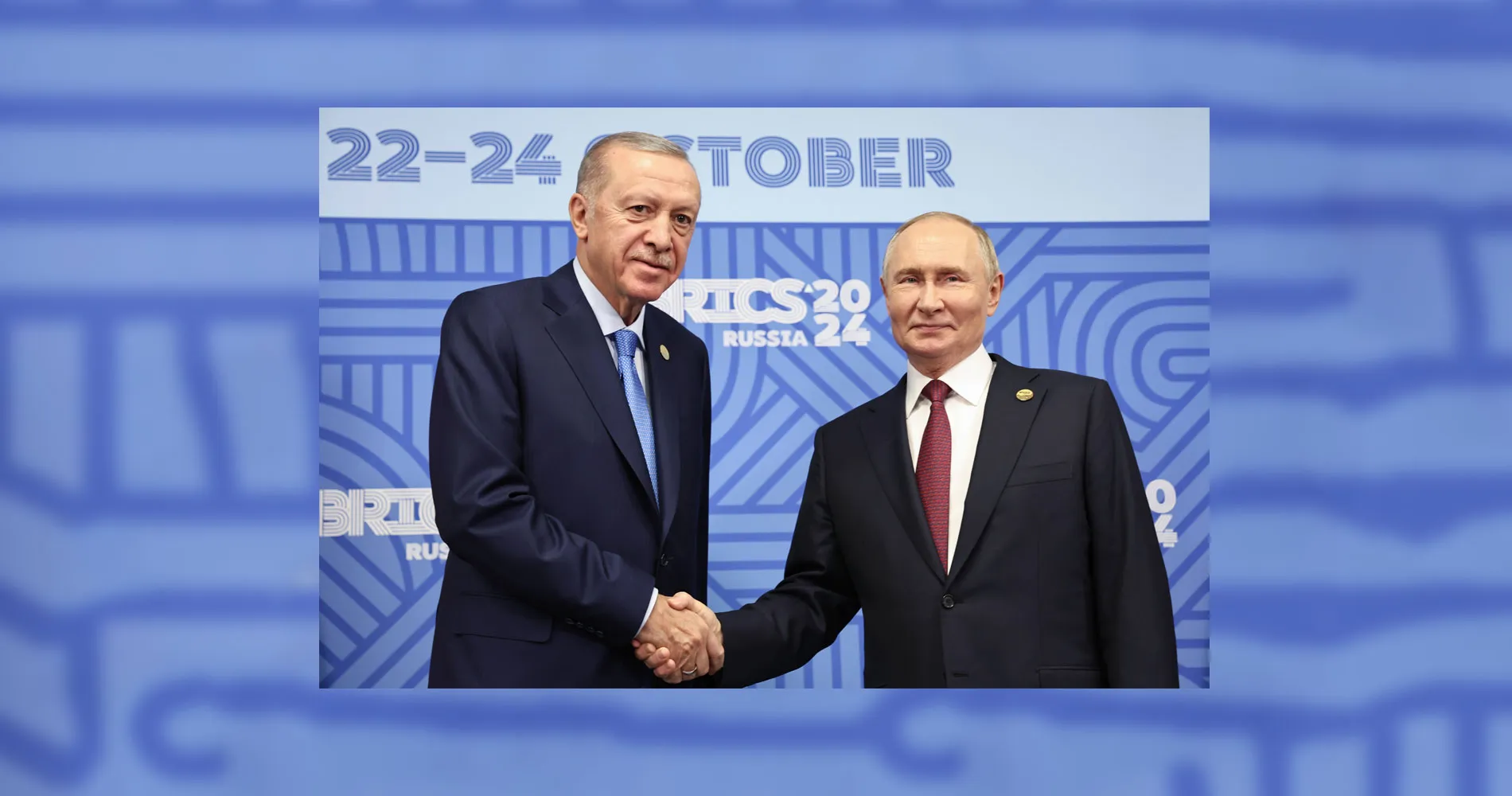The BRICS bloc is traditionally seen as counterbalancing Western influence through its inclusion of Brazil, Russia, India, China, and South Africa, and more recently Iran, Egypt, Ethiopia and the United Arab Emirates. Turkey’s recent bid for BRICS membership, represents the first NATO member to consider joining and has sparked global attention and mixed reactions. With Turkey’s increasingly diverse geopolitical alliances, the move seems destined to affect Turkey’s existing relationships, particularly with NATO and the European Union. Why would Turkey risk upsetting the applecart?
Meric Sentuna Kalaycioglu
16 December 2024
Arabic version | Chinese version | French version | German version
Under President Recep Tayyip Erdoğan’s leadership, Turkey has been pursuing a proactive and ambitious foreign policy aimed at increasing its global influence, exemplified by its formal request to join the BRICS alliance, announced by Russian foreign affairs aide Yuri Ushakov on 2 September 2024.
With a commitment to promoting a multipolar world order, countering what many perceive as Western-dominated institutions such as the World Bank and the International Monetary Fund, BRICS’ economies represent 45% of the world’s population and a 28% of global Gross Domestic Product (GDP). This makes the bloc an attractive partner for trade, investment and technological cooperation.
For Turkey, whose economy has faced challenges in recent years, BRICS membership would open doors to new markets and reduce its reliance on Western economies particularly the EU, which has traditionally been Turkey’s largest trading partner. Erdoğan has also highlighted BRICS as a voice for the Global South, providing Turkey with a platform that could bolster its influence in global economic and political matters.
This shift aligns with Turkey’s broader diversification strategy. Speaking at a press conference in Washington during the July 2024 NATO summit, Erdoğan emphasized Turkey’s desire to move from observer status in the China-dominated Shanghai Cooperation Organization (SCO) to permanent membership.
Ankara is also interested in establishing strong institutional ties with the Association of Southeast Asian Nations (ASEAN)and, since 2018, has been actively participating in ASEAN summits.
BRICS membership could support Turkey’s ambitions to establish itself as a central player in Asian geopolitics yet further. Turkey’s location as a Eurasian crossroads has always given it strategic importance, but by aligning with BRICS, Turkey could redefine its role in the Middle East and Eurasia, positioning itself as a mediator between various Western and Eastern geopolitical blocs. Additionally, BRICS membership would enable Turkey to shape discussions on major international issues, from sustainable development to counterterrorism, giving Ankara a new avenue to exert influence on a global stage.
However, BRICS membership comes with notable diplomatic complexities. NATO membership has long been integral to Turkey’s defense and security position, granting it significant influence within the alliance. NATO and Turkey’s Western allies have traditionally viewed BRICS with suspicion, interpreting it as an organization that could counter NATO’s influence. As the first NATO member to pursue BRICS membership, Turkey is navigating a delicate balance between established Western alliances and non-Western powers, including Russia and China.
Although Turkey and Russia have collaborated on energy and defense matters, including the TurkStream gas pipeline and Turkey’s first nuclear power plant at Akkuyu, they have often found themselves on opposing sides of regional conflicts such as Syria. Despite this, Erdoğan’s working relationship with Russian President Vladimir Putin has persisted, underscoring Turkey’s pragmatic approach to foreign policy. If Turkey joins BRICS, this alignment with Russia and China could encourage other leaders to consider their relations and NATO’s policies with these powers, potentially putting the alliance’s unity to the test.
Turkey desires closer economic ties with the EU and has been an official EU candidate since 1999, yet accession talks have been stalled for years owing to non-compliance with all EU principles. BRICS’ offer comes without the EU’s stringent political and democratic requirements. If Turkey aligns more closely with the positions of BRICS countries, especially those which diverge from the West, this could complicate Turkey’s EU bid.
Turkey’s efforts to secure a place in BRICS is a bold move, signaling its intention to chart a path of strategic autonomy in a world increasingly divided by power blocs. As Turkey continues to strengthen its ties with ASEAN and the SCO while simultaneously seeking BRICS membership, it is venturing into a geopolitical balancing act requiring a careful approach. While the prospect of joining BRICS aligns with Turkey’s ambition to diversify its alliances, the potential friction with NATO and the EU should not be underestimated.
For Turkey, BRICS membership is more than an economic or political alignment; it represents a vision of participating in global affairs on its own terms. This ambitious drive to connect with diverse international blocs also places Turkey under unprecedented pressure. By strengthening ties across competing spheres of influence, Turkey will inevitably face friction with at least one of its traditional alliances.
Turkey’s approach embodies the complexities of a multipolar world order, where countries increasingly seek engagement across multiple alliances rather than adherence to a single bloc or ideology Whether Ankara can maintain this delicate balance will be a true test of its foreign policy skills, and may necessitate reconsideration of its larger geopolitical ambitions.







